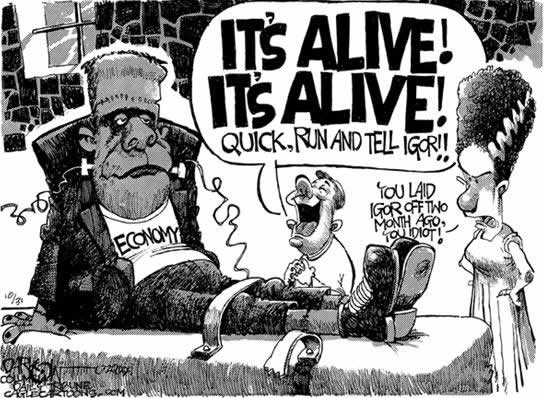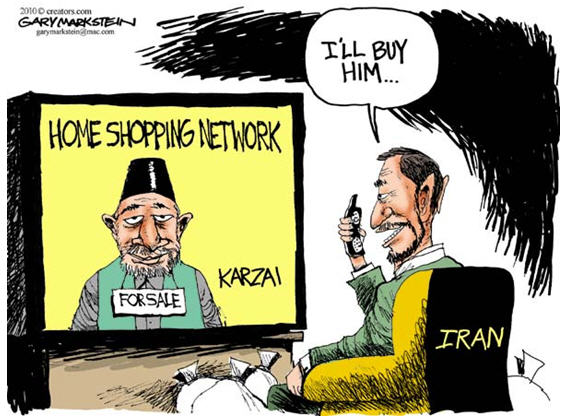Ultra Low US Inflation Makes QE A Markets Slam Dunk
Stock-Markets / Financial Markets 2010 Oct 29, 2010 - 10:20 AM GMTBy: PaddyPowerTrader
 U.S. stocks fell marginally on Thursday, weighed down by 3M who drove industrial shares lower after cutting its profit forecast, helping erase an early gain triggered by Exxon Mobil’s better-than-estimated earnings report. 3M sank 5.9% for it’s biggest loss since February 2009, after saying full-year earnings will be 6 cents lower than previously forecast. And Halliburton dropped 8% as a report cited unstable cement the company recommended to cap BP Plc’s Gulf of Mexico oil well as a factor in the spill. But Exxon bucked the downtrend and rose 0.8% as growing global fuel demand helped boost earnings.
U.S. stocks fell marginally on Thursday, weighed down by 3M who drove industrial shares lower after cutting its profit forecast, helping erase an early gain triggered by Exxon Mobil’s better-than-estimated earnings report. 3M sank 5.9% for it’s biggest loss since February 2009, after saying full-year earnings will be 6 cents lower than previously forecast. And Halliburton dropped 8% as a report cited unstable cement the company recommended to cap BP Plc’s Gulf of Mexico oil well as a factor in the spill. But Exxon bucked the downtrend and rose 0.8% as growing global fuel demand helped boost earnings.
British Airways is off 3.1% today even as Europe’s third-largest airline posted a profit of 220 million pounds, its first profit in two years. The carrier said the outlook depends on a global economic environment that remains unclear. But to put the drop in context the stock has been the best performer in the eight-company Bloomberg EMEA Airlines Index after Spain’s Iberia.
Also mining stocks are soft this morning with Rio Tinto losing 2%, Xstrat off 2.7% and BHP Billiton declining 0.9% as basic-resource shares posted the biggest loss of all 19 industry groups on the Stoxx 600 today as copper prices slumped in London.
Elsewhere Eutelsat Communications sank 3.7% for its biggest drop this month, after reporting the loss of a satellite because of “an anomaly” detected on the propulsion subsystem.
But Ferrovial has advanced 1.7% today after the manager of airports and highways posted a nine-month profit of 315 million euros, compared with a loss of 191 million euros a year earlier. Sales grew 0.3 percent to 9.1 billion euros.
Datawise from the US we’ve just had the 2nd lowest print on the US PCE inflation number (Alan Greenspan’s favoured measure of inflation) at 0.8% in history. The Fed won’t like it and it makes more QE next Tuesday a slam dunk. Should be supportive of equities & USD negative.

Today’s Market Moving Stories
European Financial Stability
European leaders meeting in Brussels overnight agreed to the establishment of a permanent crisis mechanism that will take over from the 100% taxpayer funded European Financial Stability Facility (EFSF). It will take the form of a limited Treaty amendment so that any change can be ratified at the latest by mid-2013. This crisis mechanism will only be triggered if the stability of the Eurozone as a whole is at risk. It will also specify the role of the IMF, and it will include provisions for a bail-in of private investors. Proposals will be reviewed at the EU Summit on 16-17 December. This is a victory for German chancellor Angela Merkel, and another step in the right direction for the Eurozone longer term. There is no political appetite for another Greek financial assistance programme. By opening the door to some losses for the private sector, this proposal will force member states in theory to tackle their fiscal imbalances in a credible manner or risk alienating investors. By keeping the mechanism small, it will also limit the incentive for a country to use it, while offering adequate protection for the rest of the Eurozone member states.
EU leaders also endorsed tougher budget rules, including sanctions on states that repeatedly fail to keep deficits and debt in check.
So what’s next? The European Commission, in particularly Olli Rehn’s Economic and Financial Affairs directorate, will undertake the preparatory work on the general features of a future new mechanism, i.e. the role of the private sector, the role of the IMF and the very strong conditionality under which such programmes should operate. EU President Van Rompuy has been instructed to “undertake consultations with the members of the European Council on a limited treaty change required to that effect, not modifying article 125 TEU (the “no bail-out” clause)”. Could be interesting if Ireland needs to have a constitutional referendum on this as it amends the Lisbon treaty!
German Retail
Data wise German retail sales fell 2.3% m/m in September following a 0.4% drop in August. This leaves sales 0.4% higher than year earlier, down from 3.1% previously.
Japan
The core nationwide CPI fell 1.1% y/y in September compared with a drop of 1.0% a month earlier. The consensus forecast had pointed to an unchanged -1.0% reading. The rate of unemployment fell to 5% from 5.1%, which was also the consensus forecast. However Industrial Output fell 1.9% m/m in September – far more than the consensus forecast for a 0.6% drop. And finally for Japan, the Nomura/JMMA manufacturing PMI fell to 47.2 in October from 49.5 in September.
UK
U.K. consumer confidence unexpectedly rose in October as sentiment held up before Prime Minister David Cameron’s government unveiled the scope of its budget squeeze, GfK NOP Ltd. said. The index of sentiment increased 1 point to minus 19. Economists had predicted a drop to minus 22.
Oil
Brazil said an offshore oil field may hold as much as 16 billion barrels of oil, twice previous estimates, which would make it the biggest crude discovery in the Americas in more than three decades. The Libra field in the Santos Basin off the coast of southeastern Brazil may have 7.9 billion to 16 billion barrels of oil, said Haroldo Lima, the head of the national petroleum regulator known as the ANP, according to the agency’s press office. The government owns 100 percent of Libra. Oil reserves of 16 billion barrels would make Libra the biggest find in the Americas since Mexico discovered Cantarell in 1976.

The Week Ahead
Although not a data release that generally catches our attention, Tuesday’s construction PMI from the UK will certainly be worthy of close scrutiny given the large contribution the sector made to third quarter GDP, and the US non-farm payrolls report on Friday will of course also take on its habitual prominence on the schedule. However, in truth, data will be but a sideshow in a week that boasts no less than five central bank meetings with the focus in particular on the all-important meetings in Washington and Tokyo.
On the strength of the UK’s Q3 GDP, a consensus that previously foresaw the BOE revamping its policy of QE next week, now appears to favour its postponement in 2011. However, given the pivotal role that construction played in the third quarter expansion, Tuesday’s PMI will be key in understanding the Bank’s likely presumptions about sustainability, which is, after all, its foremost consideration in formulating policy.
Shortly after the BOE delivers its verdict, ECB president Jean-Claude Trichet will inevitably face questions about his colleagues, Messrs Weber and Stark, and their growing demands for the ECB to ditch their emergency measures.Although Mr Trichet’s commitment to the measures is resolute, any hint of tension will come at a most inopportune time given renewed concerns about the Euro-zone periphery’s path towards fiscal consolidation.
Yet despite the widening in debt spreads across the region, the EUR’s fate is inextricably linked to Tuesday’s FOMC. Although speculation about the Committee’s plans for quantitative easing have been firmly on centre stage this past week, the market is home to a considerable diversity of view which lends itself to an uncertain outcome for the USD from anything but the most extreme ends of the expectations spectrum. Perhaps the most intriguing aspect of the week’s events, however, is the BoJ’s decision to bring forward its November policy meeting by a fortnight.
It is difficult not to infer, as many have done, that the meeting has been brought forward specifically to address any ‘adverse’ impact upon the JPY from the widely anticipated launch of QE II in Washington. Although adjustment of the program so soon after its launch would undoubtedly invoke much criticism, there are bigger issues at stake right now – and not least the expected commitment Japan arguably expected of the US when both promised to “be vigilant against excess volatility and disorderly movements in exchange rates” per the G20 accord. Of course it may not come to that, but all in all, the inter-linkages of all these events suggests the possibility of a particularly volatile week.

Company / Equity News
•A swell of spending by businesses on new computers, software and servers helped push Microsoft Corp.’s earnings for the most recent quarter past Wall Street’s expectations. Business spending on technology slowed to a
trickle during the economic downturn. Microsoft’s report, released after the market closed Thursday, is the most recent evidence that corporate spending is back in full swing. Microsoft said the increase in sales to businesses of the newest versions of its Windows operating system, Office programs and server software made up for softer-than-expected revenue from sales of consumer PCs in the quarter.
•Samsung Electronics., the world’s biggest maker of televisions, memory chips and flat screens, forecast weaker fourth-quarter earnings because of falling prices and the strengthening South Korean won.
•Motorola , the U.S. mobile-phone maker, reported third-quarter earnings that beat analysts’ estimates and a revenue increase for the first time in almost four years on rising sales of its Droid handsets.
•Gemalto has developed a SIM mobile-phone chip for Apple Inc. that will allow the maker of the iPhone to bypass traditional operators, Les Echos reported, without saying where it got the information. Apple plans to become a virtual mobile network operator and sell subscriptions to its service through its iTunes online store, according to the French daily.
•Symantec Corp., the world’s largest maker of computer security software, advanced in Nasdaq trading after forecasting higher sales than some analysts predicted. Revenue in the period ending Dec. 31 will be $1.57 billion to $1.59 billion, Symantec said yesterday. Analysts projected $1.55 billion.
•French retail-to-luxury company PPR SA Thursday said third-quarter sales rose 13%, lifted by brisk business from its luxury division and improved consumption in its retail markets, with growth in sales of the catalog division Redcats. The quarter showed “a sharp acceleration in sales growth with all activities contributing to this improving trend.”
•BA has followed other EU flag carriers with a strong set of H1 results that produced net profit of £107m versus consensus of £41.5m. In the period it cut capacity by 6.2% year-on-year and saw yields climb 17%. Its outlook statement talks of “positive” trends although it highlights the upcoming increase in UK APD as “unhelpful”. Other airlines too (Virgin, easyJet) have raised the APD issue this morning as increases kick in over the weekend. Long-haul in particular sees a 50% rise in APD. A family of four will pay £340 in taxes for a flight to Australia, up from £220 now.
•Even if it was little surprise that WPP beat expectations in Q3 following the comments from Sir Martin Sorrell earlier in the week, still the organic growth rate of 7.5% was still stronger than many had expected. Equally the comment that the Group would exceed its full year operating margin target was very welcome. The growth in US and the UK was particularly strong, up 9.9% and 7.4% respectively, but Continental Europe also showed improving growth of 6%.
By The Mole
PaddyPowerTrader.com
The Mole is a man in the know. I don’t trade for a living, but instead work for a well-known Irish institution, heading a desk that regularly trades over €100 million a day. I aim to provide top quality, up-to-date and relevant market news and data, so that traders can make more informed decisions”.© 2010 Copyright PaddyPowerTrader - All Rights Reserved
Disclaimer: The above is a matter of opinion provided for general information purposes only and is not intended as investment advice. Information and analysis above are derived from sources and utilising methods believed to be reliable, but we cannot accept responsibility for any losses you may incur as a result of this analysis. Individuals should consult with their personal financial advisors.
PaddyPowerTrader Archive |
© 2005-2022 http://www.MarketOracle.co.uk - The Market Oracle is a FREE Daily Financial Markets Analysis & Forecasting online publication.



